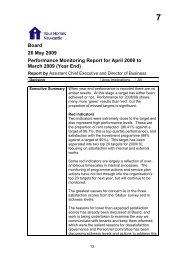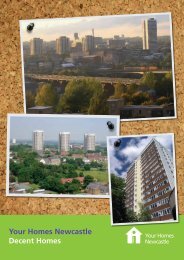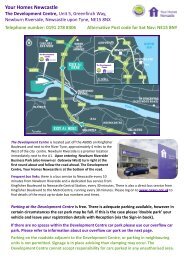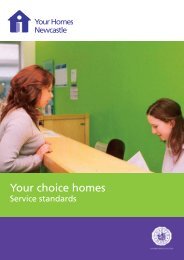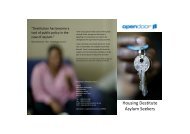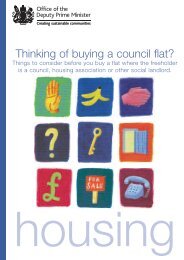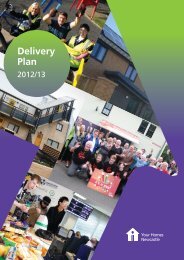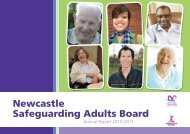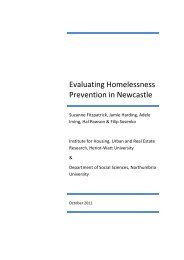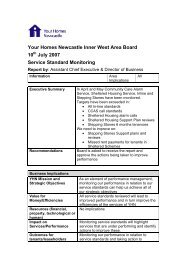Allocations and Lettings policy - Your Homes Newcastle
Allocations and Lettings policy - Your Homes Newcastle
Allocations and Lettings policy - Your Homes Newcastle
Create successful ePaper yourself
Turn your PDF publications into a flip-book with our unique Google optimized e-Paper software.
DeliveryPlan2012/13<strong>Allocations</strong><strong>and</strong> <strong>Lettings</strong><strong>policy</strong>April 2012
Version control tableOriginal version published: 01 April 2012Current version number: 1Date current version published: 01 April 2012Due date for next review: 01 April 2013Author:Contact officers:Julie MarkhamJulie Markham<strong>Allocations</strong> <strong>and</strong> <strong>Lettings</strong> SpecialistFairer Housing UnitHousing, Planning <strong>and</strong> TransportEnvironment <strong>and</strong> Regeneration Directorate0191 277 7859 (ext.27859)julie.markham@newcastle.gov.uk3
ContentSection Subject Page1 Introduction Aims of our scheme How the scheme works Legislation Statement of choice Equality statement Confidentiality statement2 How the scheme works <strong>and</strong> what help is available What properties are advertised How we advertise <strong>and</strong> select people for homes Help to use the scheme3 Who is eligible Who is eligible Who is not eligible4 How to apply What you need to tell us What the Offices can help you with Housing applications from members of staff <strong>and</strong> their families667788899910111111131313145 Verification checks 166 How to find a home18 Information <strong>and</strong> advertising18 Bidding18 Letting a home18 Offer of a property19 Property specific criteria207 How we select people for properties23 B<strong>and</strong>ing explained23 Financial circumstances31 Local connection31 Exceptional need to remain in a specific area32 Recommendations <strong>and</strong> restrictions32 Deliberately worsening your circumstances32 Review periods3233 Selection for properties8 Local lettings plans 349 Other lettings arrangements 354
Housing management lets35 Tyne <strong>and</strong> Wear mutual exchange scheme35 Low cost home ownership <strong>policy</strong>35 Private rented offer36 Extra care <strong>and</strong> supported housing37 Succession37 National mobility schemes3737 Garages37 Regeneration38 Family intervention tenancies10 Monitoring <strong>and</strong> openness 3911 Reviews <strong>and</strong> Appeals Right to appeals Right of reviews Homeless appeals Housing association appeals12 In the Future Gateway Sub-regional lettings scheme13 Reviewing <strong>and</strong> Amending the Policy414142424243434344Exceptions Policy44Appendix 1Contact details for Community Housing Offices <strong>and</strong> <strong>Your</strong>Choice <strong>Homes</strong>45Appendix 2 Contact details for Housing Associations 46Appendix 3 How the scheme works – Flow Chart 47Appendix 4Eligibility to join YCH relating to immigration status orpersons from abroad485
1. Introduction<strong>Newcastle</strong> City Council recognises that what makes a house feel like home is important.A home can provide a base from which to lead our lives <strong>and</strong> build a future. It helpstowards realising ambitions <strong>and</strong> can provide stability <strong>and</strong> security.The <strong>Allocations</strong> <strong>and</strong> <strong>Lettings</strong> Policy helps deliver the main priorities of the City Council. Itcontributes to:Getting <strong>Newcastle</strong> working by recognising the need to maintain <strong>and</strong> grow the City’spopulation <strong>and</strong> attract skilled people <strong>and</strong> their families to live <strong>and</strong> work in <strong>Newcastle</strong>.Tackling inequalities by ensuring that you are provided with the right information <strong>and</strong>support to find the right housing option to meet your needs.Decent <strong>and</strong> safe neighbourhoods by talking to you about what you need <strong>and</strong> aspireto have <strong>and</strong> provide you with a range of options to help you make the right choice ofhousing. We believe that by helping you to make the right choice will strengthencommunities, increase independence, employability <strong>and</strong> satisfaction with where youlive.The Council’s <strong>Allocations</strong> <strong>and</strong> <strong>Lettings</strong> <strong>policy</strong> sets out how to apply for social housing in<strong>Newcastle</strong>. It also sets out how we decide who is selected for social housing.In <strong>Newcastle</strong> we have higher dem<strong>and</strong> for our properties than the number of housesavailable. This means that there may be a long wait for a social home <strong>and</strong> whilst we maynot be able to offer everyone the social home they would like we will offer advice <strong>and</strong>assistance on other housing options.The aims of our schemeFor our customers we aim to:Offer a simple, fair <strong>and</strong> transparent processMake sure those who have the greatest need for housing have the greatestopportunity to get itOffer realistic options <strong>and</strong> informed choicePromote independence by providing support to find <strong>and</strong> remain in their homes.For our communities we aim to promote:Places where people want to live <strong>and</strong> work by allowing people to make positivechoicesEquality of opportunitySustainable <strong>and</strong> mixed communities6
We will achieve these aims by having an <strong>Allocations</strong> <strong>and</strong> <strong>Lettings</strong> <strong>policy</strong> which:Puts people at the heart of the processMakes best use of housing resourcesCombines housing need <strong>and</strong> support <strong>and</strong> care requirementsOffers a range of housing optionsHelps us to underst<strong>and</strong> housing need <strong>and</strong> respond appropriately.This <strong>policy</strong> will also contribute to the strategic objectives of the Council in making bestuse of its resources.We will give you good quality information about our services. This will help you makebetter choices about your future home.How the scheme works<strong>Newcastle</strong> City Council <strong>and</strong> <strong>Your</strong> <strong>Homes</strong> <strong>Newcastle</strong> (YHN), the housing managementorganisation for council housing, have a ‘choice based lettings <strong>policy</strong>’. This meansyou are offered choice <strong>and</strong> involvement in selecting a home. We also work with otherregistered social housing providers where the council has nomination rights.<strong>Your</strong> <strong>Homes</strong> <strong>Newcastle</strong> (YHN) manages the choice based lettings <strong>policy</strong> on behalf of<strong>Newcastle</strong> City Council <strong>and</strong> its partner housing associations through <strong>Your</strong> Choice <strong>Homes</strong>(YCH). YHN <strong>and</strong> the partner l<strong>and</strong>lords will share the responsibility to make sure you areaware <strong>and</strong> underst<strong>and</strong> the <strong>policy</strong> <strong>and</strong> the process.The YCH office in the city centre is like an estate agent. It provides advice on housingoptions, advertises homes, tells you how to use the scheme, helps you to bid <strong>and</strong>assesses housing need.Help <strong>and</strong> advice is also available from other teams, like the Council’s Housing AdviceCentre or YHN teams like Community Housing Offices, Pathways Advice <strong>and</strong> SupportService or the Young People’s Service.Information about the st<strong>and</strong>ards of service you should expect are available from YCH,the YHN website (www.yhn.org.uk), <strong>and</strong> any other YHN office.In this <strong>policy</strong>, when we talk about housing offices, officers <strong>and</strong> managers we mean YHN,its offices, local Housing Service Managers <strong>and</strong> similar officers with partner l<strong>and</strong>lords.See Appendix 1 for a list of housing management contacts <strong>and</strong> addresses, <strong>and</strong>Appendix 2 for a list of housing associations.Legislation7
In operating this scheme, we have followed legislation set out in the Housing Act 1996 asamended by the Homelessness Act 2002, the Localism Act 2011 Chapter 7, theAllocation of Accommodation Code of Guidance for local housing authorities that wasissued by the Government in November 2002, August 2008 <strong>and</strong> November 2009. Wehave also considered relevant case law <strong>and</strong> regulations.Statement of choiceWe aim to give all eligible applicants choice in where they live. You have the opportunityto express preference by being able to bid for areas <strong>and</strong> types of housing. However, thismust be balanced with the need for the Council to meet its legal duties as a localauthority in relation to addressing local housing need <strong>and</strong> ensuring the efficientmanagement of its housing stock.Equalities statementWe are strongly committed to fairness <strong>and</strong> equal treatment for all. We aim to preventunlawful discrimination (both direct <strong>and</strong> indirect), harassment <strong>and</strong> victimisation on thegrounds of age, disability, pregnancy <strong>and</strong> maternity, race, religion or belief, sex, sexualorientation <strong>and</strong> transsexuality. More information on our legal duties <strong>and</strong> responsibilities isavailable on <strong>Newcastle</strong> City Councils website.Confidentiality statementWe will treat the information you provide as confidential. It will only be available to thoseemployees who are managing <strong>and</strong> monitoring allocations <strong>and</strong> lettings, which includeslocal authorities <strong>and</strong> housing associations participating in the Tyne <strong>and</strong> Wear choicebased lettings scheme. <strong>Your</strong> details are also subject to the controls of the DataProtections Act regarding unauthorised disclosure. Any other sharing of information willonly happen with your consent or in circumstances that the law provides to protectpeople from harm or prevent crime.8
2. How the scheme works <strong>and</strong> what help is availableTo apply for help with housing you will need to be 16 or over.When you apply we will discuss with you the reasons you need help with housing so thatwe can underst<strong>and</strong> your needs <strong>and</strong> aspirations. We will then provide you with a range ofoptions to suit your needs. This may be providing information, advice <strong>and</strong> support to helpyou remain in your home, or help finding privately rented accommodation, low cost homeownership or social housing.Dem<strong>and</strong> for our properties is far greater than properties available so there may be a longwait for a social home. We may not be able to offer everyone the social home they wouldlike so we will offer advice <strong>and</strong> assistance on other housing options.What properties are advertisedThrough YCH we will advertise <strong>and</strong> allocate:homes managed by YHN on behalf of the Councilhomes owned by YHN or its charitable subsidiary Leazes <strong>Homes</strong>.We will also:advertise <strong>and</strong> nominate to partner social l<strong>and</strong>lords according to the nominationsagreement. The nominations agreement says that at least 50% of all availablehomes will be sent to YCH to advertise. If a partner builds new homes we willadvertise 100%.advertise low cost home ownership initiatives where appropriate.advertise <strong>and</strong> allocate extra care <strong>and</strong> supported housing where appropriate.We will also:advertise private rented accommodation where appropriate.How we advertise <strong>and</strong> select people for homesWe aim to advertise homes on a weekly basis. You can bid for up to three homes eachweek. If you are the successful person for more than one property at the same time youwill not be invited to view all properties. Instead, you will be asked to select one as aformal offer of accommodation.Once on offer for a property any future bids will not be considered. See Section 6, ‘Howto Find a Home’. See our guide to YCH in Appendix 3.To be considered for a home you must:be eligible to bid on the scheme9
meet any specific criteria on the advert, <strong>and</strong>bid for the propertyOne of the main aims of the <strong>policy</strong> is to offer choice to people. However we have a dutyto meet housing need, <strong>and</strong> because of this we will b<strong>and</strong> people according to theirhousing need. The b<strong>and</strong>ing system will ensure that those in the greatest housing needare given preference for re-housing. In some circumstances properties may be offered toexisting tenants which will release a social home for someone else in housing need.If you are eligible, your application will be placed in either B<strong>and</strong> A, B, C or D according toyour housing need. We will normally offer property to the person who has the greatestneed. This is applicants in B<strong>and</strong> A. If applicants are in the same b<strong>and</strong> we will offer theproperty to the person who has been in that b<strong>and</strong> the longest.See Section 6, ‘How to find a home’. This tells you about how to bid <strong>and</strong> thecriteria that are placed on adverts.Help to use the schemeIf you need help to join the scheme or to use the scheme you will be offered advice <strong>and</strong>support.We will try to identify your support needs when you apply. We will work with you <strong>and</strong>anyone who supports you to make sure you can make your bids.We can also provide information in alternative formats. For example, if your firstlanguage is not English we can arrange for an appointment to be made with aninterpreter via a telephone interpretation service.10
3. Who is eligibleWho is eligibleAnyone aged 16 years or over can apply. It doesn’t matter what your current housingcircumstances are. However, there will be some people who will not be eligible. If youare under 18 any offer of accommodation will be linked to a support package <strong>and</strong> youmay need a trustee who can hold the legal title of your tenancy.Who is not eligibleThose who will not normally be accepted onto the scheme are:Persons from abroad or persons subject to immigration controlThe terms ‘person from abroad (PFA) <strong>and</strong> ‘person subject to immigration control’ (PSIC)have a housing specific meaning. There are two categories of person from abroad:Persons subject to immigration control within the meaning of the Asylum <strong>and</strong>Immigration Act (AIA) 1996Persons who are not PSIC but are ‘other persons from abroad’ for example aBritish or Commonwealth citizen who has failed the habitual residence test.Applicants in either category may be eligible as determined by the Secretary of State.The rules that concern who we can accept onto the scheme are very complex. Pleasesee Appendix 4 for more informationPeople who are guilty of unacceptable behaviourThis includes any person who the Council decides should be ineligible because they or amember of their household has been guilty of behaviour serious enough to make themunsuitable to be a tenant.The Council, its partner l<strong>and</strong>lords <strong>and</strong> people who live in <strong>Newcastle</strong> have a right toexpect certain st<strong>and</strong>ards of behaviour. Therefore before we accept you onto the scheme<strong>and</strong>/or make a firm offer of a property, we may seek references to help us decidewhether or not you are eligible. These will usually be from previous l<strong>and</strong>lords.Unacceptable behaviour is behaviour which would, if the person was either a Counciltenant or a member of a Council tenant’s household, entitle the l<strong>and</strong>lord to takepossession proceedings under certain grounds contained in the Housing Act 1985.Some examples of the type of behaviour that could make someone ineligible could be:Previous/current rent arrears or other breaches of tenancyPrevious/current property damage11
Serious anti social behaviour. For example, nuisance or annoyance toneighbours, discriminatory behaviour or harassment, violence <strong>and</strong> intimidation tothe community, YHN , a Housing Association, Council staff or elected membersConvicted of using or allowing a property to be used for illegal or immoralpurposes, including offences involving illegal drugsCommitting domestic violenceConvicted of an offence in the property or in the area of the propertyMaking a false statement in order to obtain accommodationFailing to provide relevant information that has been reasonably requested toverify an application for housingThese examples apply no matter who your l<strong>and</strong>lord is/was when they happened,<strong>and</strong> no matter what form of tenure you had at that time. You did not have to be asecure tenant nor did an eviction have had to take place. The test is had you beena secure tenant at that time was the behaviour sufficiently unacceptable to entitle alocal authority l<strong>and</strong>lord to a possession order.<strong>Your</strong> individual circumstances will be fully considered when deciding if you shouldbe made ineligible.The test is whether you or a member of your household were guilty of behaviourserious enough to make you unsuitable to be a tenant of the Council, <strong>and</strong> whetherin all the circumstances at the time of your application you are still considered tobe unsuitable.See Section 5, ‘Verification checks’ for more information.If the Council decides you are not eligible the Manager who made the decision will writeto you <strong>and</strong> tell you the reasons why, what information they have considered <strong>and</strong> whatyou can do to become eligible. You have the right of appeal against this decision <strong>and</strong>may also ask for a review of this decision at a later date should you be able to provideevidence that the reasons for your ineligibility have been addressed.See Section 11 ‘Reviews <strong>and</strong> Appeals’ which will tell you how to do this.We will provide help <strong>and</strong> advise on how to address any issues you may have in order foryou to become eligible.12
4. How to applyWhat you need to tell usYou will need to provide us with information about:You <strong>and</strong> who you want to share your home with (to match with vacancy size)<strong>Your</strong> housing history<strong>Your</strong> housing need<strong>Your</strong> support needsDemographic information (for monitoring purposes)<strong>Your</strong> financial circumstancesThe names of two referees <strong>and</strong> permission to seek references from themWhere you would like to liveSometimes we may need to contact other agencies to decide your eligibility.You can contact YCH or any Housing Office when you want to apply.. We will contactyou to tell you that we have received your request to move <strong>and</strong> tell you about whatchecks we have to make. See Appendix 5 ‘Service St<strong>and</strong>ards’ <strong>and</strong> Appendix 1which gives a list of contact details.What the Offices can help you withNo matter where you apply, we will be able to:Discuss why you want to moveProvide information on other housing optionsHelp you apply <strong>and</strong> get the information needed to verify your applicationTell you how likely it is you will be housed in your area of choiceProvide assistance in bidding for accommodationArrange appropriate supportSee Section 5 ‘Verification checks’ for more information.13
We will offer additional help if you have difficulty at any stage of the process or you havea language or literacy difficulty. We can also arrange a home visit for you if you wouldprefer this or if you are disabled.RememberYou will need to confirm that the information you provide is truthful. It is a criminaloffence if you knowingly or recklessly make a statement which is false or withholdinformation which we required you to give. In such circumstances we mayautomatically refer your case for legal action <strong>and</strong> if you have been granted atenancy we may commence possession proceedings to evict you.Please take care when providing information <strong>and</strong> supporting documents.You must also ensure that you notify us of any change to your circumstanceswhich affect your application. We may take legal action <strong>and</strong> evict tenants whohave knowingly misled us in any way.If you are eligible for the scheme we will write to you <strong>and</strong> confirm:<strong>Your</strong> application reference numberThe B<strong>and</strong> you are in <strong>and</strong> the date you were placed in that b<strong>and</strong>How to find out about homes <strong>and</strong> how to bidHow long you are likely to wait for a homeIn accepting accommodation offered through YCH you accept that you will live inthis property as your only or principal home. You will need to tell us if you have aninterest in any other property. If you have an interest in any other property thatmeets your housing needs then you are likely to be placed in B<strong>and</strong> D. See section7 ‘B<strong>and</strong>ing Explained’.Applying to the scheme does not mean any participating l<strong>and</strong>lords have to offer you aparticular property or any property at all.We will contact you on a regular basis, usually once a year, to make sure you still wish toremain on the scheme.Housing applications from members of staff <strong>and</strong> their familiesTo show that the <strong>policy</strong> is fair <strong>and</strong> transparent, applications for housing from employeesor representatives of the following organisations must declare their interest when theyapply or when they are offered a property.<strong>Newcastle</strong> City Council, including elected members<strong>Your</strong> <strong>Homes</strong> <strong>Newcastle</strong>, including elected members14
Applications from relatives, members of their household or close friends of employees<strong>and</strong> elected members must also declare an interest.These applications will be assessed in the normal way, but offers of accommodation willnot be made without the approval of the Manager of Housing Needs/<strong>Your</strong> Choice <strong>Homes</strong>.15
5. Verification checksYou will need to provide information when you apply as we will need to check the detailsprovided with your application. Some of the things we may ask for are:Proof of identity <strong>and</strong> household detailsInformation about were you have lived in the last 5 yearsInformation about eligibility <strong>and</strong> suitability to be a council tenantInformation about your financial circumstancesConfirmation of a local connection to <strong>Newcastle</strong>In addition, at the time of signing your tenancy agreement you may be expected toprovide proof of your identity, such as:A passport or photo driving licence orAn acceptable recent photo of yourself orHave your photo taken by ourselvesWe will also require confirmation that you meet the specific criteria for the property.We aim to give customers who apply choice <strong>and</strong> quality of service. However, thecommunities where you may choose to live have a right to expect certain st<strong>and</strong>ards ofbehaviour from their neighbours, as does your l<strong>and</strong>lord. You, as a potential tenant, haveobligations to the communities where you will live <strong>and</strong> to your l<strong>and</strong>lord. We tell you aboutthese checks when you apply <strong>and</strong> that it may include references about your suitability asa tenant. This may also apply to anyone that you wish to have living with you.See Section 3, ‘Who is eligible’.The checks may be done at any stage of the process <strong>and</strong> on more than one occasion forthe following reasons:Current or previous rent arrears or other breaches of tenancyCurrent or previous property damageHarassment/anti-social behaviour or relevant criminal activityIf you are an existing council tenant you will be expected to leave your current home in areasonable state of decoration <strong>and</strong> undamaged (other than fair wear <strong>and</strong> tear). As partof our checks we will visit you at home. If there are any issues you will be given thechance to either repair or pay for any damage. In some cases of very serious ormalicious damage, you may be deemed ineligible or we may be unable to complete ourchecks until further action is taken.16
If you can’t provide us with all the required information to confirm your circumstances <strong>and</strong>suitability as a tenant you may ask us get references from previous or current l<strong>and</strong>lords.Council Tax records may be checked to confirm you live in the address you are applyingfrom. Checks may also be made with the police through the Safer Estates Agreement orwith a relevant statutory agency where appropriate.If the checks are satisfactory <strong>and</strong> you meet the stated eligibility criteria, you will beformally accepted to the scheme.If you fail to provide information that has been reasonably requested we will not be ableto complete our check <strong>and</strong> you will not be offered a property.If the verification checks are not satisfactory then you will not be eligible <strong>and</strong> will not beable to bid for any available home. This also applies if you were originally eligible butbetween that time information has come to light that shows that you should no longer beconsidered a suitable tenant.In these circumstances we can withdraw an offer of accommodation where there hasbeen a change in circumstancesIn some very exceptional cases you may still be offered a tenancy subject to specificconditions such as an Acceptable Behaviour Agreement. This will normally be offeredthrough a Housing Management Let <strong>and</strong> will be at the discretion of the relevant Manager.See Section 9 ‘Other <strong>Lettings</strong>’.RememberYou need to provide the information required to carry out the verification checks.This includes giving consent to contact other relevant people if this cannot beeasily confirmed by YHN or the Council.17
6. How to find a homeWe will discuss with you the reasons why you are applying for housing. This will help usto underst<strong>and</strong> your needs <strong>and</strong> aspirations. Where possible we will then provide you witha range of options to suit your needs. This may be providing information, advice <strong>and</strong>support to help you remain in your home, or help finding privately rented accommodation,low cost home ownership or social housing.Information <strong>and</strong> AdvertisingWe will tell you where to get information on available homes which will include social <strong>and</strong>privately rented housing. We will also advertise any available low cost home ownershipschemes. If you have difficulty accessing the service we may also provide additionalinformation <strong>and</strong> arrange advice <strong>and</strong> support from a range of partner agencies.BiddingTo bid you can:Log on to our website www.tyne<strong>and</strong>wearhomes.org.uk, search for a home <strong>and</strong>bid Text your bid using your mobile phone to 0753 740 4367 Call our automated telephone line 0300 7777245Email us at tyne<strong>and</strong>wearhomes@yhn.org.ukWrite to us <strong>and</strong> tell us which home you want to bid forCall in to any Office or partner l<strong>and</strong>lordContact <strong>Your</strong> Choice <strong>Homes</strong> or any YHN Community Housing OfficeWe aim to advertise properties each week. We will inform you of the advertising cycle<strong>and</strong> where you can find out about available homes when you apply to the scheme.When we advertise properties the advert will confirm the deadline for bids. You can bidfor up to three properties in any given lettings week. The advertising cycle may besubject to change.Letting a homeWe will compile a list of people who have bid for each property. Where more than oneperson has bid we will check if they meet the criteria for the property. People with thehighest housing need will normally be selected; B<strong>and</strong> A having the highest priority <strong>and</strong>B<strong>and</strong> D the lowest. Where there is more than one person in the same B<strong>and</strong> applying forthe property the person who has been waiting in the b<strong>and</strong> the longest will be selectedfirst. They still have to meet any specific criteria for the property.18
There might be some cases where someone else will be selected first but this will only befor good housing management reasons. See Section 7 ‘How we select people forproperties’.Individual Housing Associations, private l<strong>and</strong>lords <strong>and</strong> other l<strong>and</strong>lords may decide not touse the b<strong>and</strong>ing system or waiting time as a tiebreak in circumstances where it does notfit with the policies of their organisation or criteria for certain schemes. YCH can provideinformation about certain schemes, but if you are in any doubt you should contact therelevant Housing Association for further advice.Before you are offered a property, further verification checks may be carried out toconfirm identity, housing need, financial circumstances, <strong>and</strong> update information frompreviously obtained references. See Section 5, ‘Verification checks’.Should your circumstances have changed then we may not be able to offeraccommodation.We may not grant you a tenancy, <strong>and</strong> may review whether you are still eligible, if at thisstage you tell us:You want to have a joint tenancy with someone who is, or would be ineligible tojoin the scheme. For example for previous unacceptable behaviour; orThere is someone in your household who was not previously included in yourapplication, <strong>and</strong> their previous behaviour has been serious enough to make youineligible for accommodation as set out in Section 3; orYou or someone in your household has behaved in a way that would make youineligible since you joined the scheme; orYou do not intend to use an offer of accommodation as your main home; orYou have the financial means to find your own accommodation.Some properties may be advertised as an ‘always available property’ <strong>and</strong> let to the firstsuitable customer. This will be following formal agreement after a recommendation by alocal Manager <strong>and</strong> may include people who are ineligible because of unacceptablebehaviour where they think it appropriate. See section 9 ‘Other lettingsarrangements’.Offer of a propertyIf you are the successful person for more than one property at the same time you will notbe invited to view all properties. Instead you will be asked to decide which property youwish to consider. This means that the other property can be offered to another person.In this case, if you do not act reasonably in reaching a quick decision, the l<strong>and</strong>lordreserves the right to act as if your interest has been withdrawn.If you are selected, the appropriate l<strong>and</strong>lord will make a formal offer, arrange a viewing<strong>and</strong> then let the property. You will be expected to confirm that you accept as quickly as19
possible. This would normally be no later than 48 hours if we have to write out to you.This may vary depending on your chosen method of contact. For example, if you ask tobe contacted by text message we may ask you to respond sooner.If you have accepted an offer of accommodation we will not consider you for anyother property. You would only be able to continue to bid <strong>and</strong> be considered for otherproperties when you confirm that you have refused the offer or the offer is withdrawn bythe l<strong>and</strong>lord.Where adults share accommodation as partners, or there is a wish for two or more adultmembers of the household to share the commitment to the household, a joint tenancy willnormally be granted.Either you or the l<strong>and</strong>lord can withdraw from the arrangement up until the point youaccept the tenancy in writing. This is when you sign the tenancy agreement <strong>and</strong> a formalagreement is reached.When you accept an offer of a tenancy you accept that you will live in this tenancy asyour main home.Before this stage offers may be withdrawn in circumstances such as:You have provided false or misleading informationThe property is required for exceptional housing management reasonsThe outgoing tenant has withdrawn their notice of termination.Property specific criteriaAll Council properties managed by YHN will be advertised unless a specific propertyneeds to be used for a Housing Management Letting or for a Local <strong>Lettings</strong> Plan. Localhousing managers will be responsible for deciding which properties are not advertisedthrough the scheme. This will be authorised by a Senior Manager <strong>and</strong> YCH for auditpurposes. We will produce information to tell you how many homes are let in this way.Given the dem<strong>and</strong> for housing in <strong>Newcastle</strong> we will make best use of stock by makingsure you are matched to the specific property type to meet your need. This means wewill normally tell you a minimum or maximum size of household that the property issuitable for. When deciding the size of property you can bid for, we will take into accountthe number of people included in the application that would reasonably be expected tolive with you, their gender <strong>and</strong> age <strong>and</strong> relationships.In some circumstances we may choose to under occupy properties where:The property is not in high dem<strong>and</strong>A local lettings plan is in placeThere are specific management reasons as to why this will happen20
The property has special features that makes it particularly suitable for certainapplicantsThe property is in a neighbourhood which has a shortage of a particular propertytypeOnly those applicants who bid <strong>and</strong> who fit the criteria will be considered. However, whereno specific criteria are attached to a property then any customer who bids will beconsidered.The following are examples of specific criteria that may be placed on a property:CriteriaMinimum ageMinimum or maximum number ofpersonsPreference to people requiringcare or support due to age ordisabilityReasonApplies where a property/scheme has beendesignated for certain age groups - forexample Older Persons Housing Scheme,some bungalows <strong>and</strong> multi storey blocks. Itwould normally be expected that allmembers of the household fit the criteria.We prefer that properties are not under orover occupied.Warden supported housing schemes, extracare schemes or other Older PersonsHousing Schemes.Preference to disabled persons /wheelchair usersNo dogs or catsAdapted propertyWhere a property or scheme has a formalno pets <strong>policy</strong> (normally any properties withcommunal entrances)If an adult is responsible for a child’s day to day care the child will be counted as amember of the household. This includes situations where two adults have equal jointcare. However, if a child only visits at weekends <strong>and</strong> holidays, they will not be countedas a member of the household. This affects what size or type of property you will beconsidered for.In cases when a child visits at weekends <strong>and</strong> holidays we will tell you about otherhousing options that may be available where extra bedrooms could be provided toaccommodate children. Supporting evidence may be requested from other agencies orthe court depending on the individual circumstances.Where a property has been adapted to meet the needs of people with a disability,preference will be given to people needing those specific adaptations. When there is no21
applicant who can make best use of the property we may remove the adaptations oradvertise it as is.22
7. How we select people for propertiesB<strong>and</strong>ing explainedWe use a B<strong>and</strong>ing system to identify those in the greatest housing need <strong>and</strong> to reflect theaim <strong>and</strong> objectives of our <strong>policy</strong>. We will decide which B<strong>and</strong> you will be placed independing on the information you provide in your application. The following tableprovides details on the B<strong>and</strong>s.In all cases you will need to provide supporting evidence to verify your application. Whenyou are placed in a B<strong>and</strong> you can ask us to review this at any time if you feel yourcircumstances have significantly changed.B<strong>and</strong> A – Immediate <strong>and</strong> exceptional need or at risk of serious harm Emergency rehousing is required for medical reasons You are at risk of immediate <strong>and</strong> serious harm Approved homeless cases in temporary accommodation where there is anurgent need to free up accommodation <strong>Your</strong> home is made uninhabitable due to fire flood or other such emergencyB<strong>and</strong> B – Urgent need You have a severe disability or health grounds You are experiencing domestic violence or harassment amounting to violence orthreats of violence You are homelessness <strong>and</strong> the Council has a legal duty to house you <strong>Your</strong> home is subject to major building work or will be demolished as part of aregeneration scheme You are occupying housing that is unsatisfactory because it is insanitary orstatutorily overcrowded You would suffer hardship if you could not move to a particular area Housing you would enable better use to be made of social housing You have welfare needs because you require significant ongoing care <strong>and</strong>support23
B<strong>and</strong> C – Medium housing need You have been accepted as homeless but are not priority under the legislation You have been accepted by the Council as homeless <strong>and</strong> priority, but you havebeen found to be intentionally homeless You are a young person leaving care You need to move on from supported accommodation to help maintain apathway to independence You are a council tenant who has good tenant status You are a foster carer who may not have a child living with you at the momentbut need to move to be able/continue to foster (confirmation will be requiredfrom Social Services) or you have child protection issues You are overcrowded You have a disability or health condition <strong>and</strong> your current home is having someimpact on this You share facilities with another household You lack basic facilities or your home is in serious disrepair You need to move due to a relationship breakdown You need to move for employment, education or training reasons, such asreturn from service in the armed forces You have a welfare need because you provide or receive some care <strong>and</strong>support <strong>Your</strong> household is forced to live apart You live in housing that is linked to your job <strong>and</strong> you have retired <strong>and</strong> yourproperty is required for the new employee You are suffering financial hardship <strong>and</strong> cannot meet the cost of providing yourhomeB<strong>and</strong> D – Low housing need You have no recognised housing need in B<strong>and</strong> A, B or C24
You have the financial means to find alternative accommodation You have no local connection with the City or have applied to another partnerthrough the Tyne <strong>and</strong> Wear lettings scheme. You have accommodation available to you that meets your housing needs.B<strong>and</strong> A - Immediate <strong>and</strong> exceptional need or at risk of serious harmThis is for circumstances which are so serious that if you are not housed immediatelythere will be a risk of very serious harm.Examples of such circumstances include:You require emergency rehousing for very urgent medical reasons as it is notpossible for you or a member of your household to continue residing in yourproperty. You will need to provide information to support your need <strong>and</strong> this willbe assessed by the YCH Health <strong>and</strong> Welfare Team.You or a member of your household are at serious risk of being harmed due todomestic violence, harassment or other exceptional reason <strong>and</strong> you cannotreturn to your home.Approved homeless cases in temporary accommodation where there is an urgentneed to free up accommodation. This will be jointly agreed by the council <strong>and</strong>YHN.People whose home is made uninhabitable due to fire flood or other suchemergency.In these circumstances you may be given B<strong>and</strong> A status <strong>and</strong> may be made a singlesuitable offer to discharge any legal duty.If you receive an offer either after making a bid or as a result of a direct offer, <strong>and</strong> it is areasonable offer which is suitable to meet your needs, we have fulfilled our legal duty toyou. We will write to you <strong>and</strong> tell you if this is the case. If you do not accept areasonable offer your application will be reassessed <strong>and</strong> placed at the bottom of anotherappropriate B<strong>and</strong>.You have the right to request a review of the decision to place you in another B<strong>and</strong> <strong>and</strong>the suitability of any offer made to you.People who are placed in B<strong>and</strong> A will have their housing need reviewed every two weeksto determine whether they should remain in the B<strong>and</strong>.B<strong>and</strong> B – Urgent needThis is for situations where you are in an urgent need to move within a short period oftime.25
Severe disability or health grounds<strong>Your</strong> housing is seriously impacting on you or a member of your household’s medicalcondition or is seriously affecting your or their quality of life or ability to manage. You areable to reside in your current home on a short term basis ie. three months whilstalternative housing is sought. We will consider the impact your home <strong>and</strong> surroundingenvironment has on you <strong>and</strong> whether or not you are able to access essential facilitieswithin your home. Essential facilities include your bathroom, toilet, kitchen <strong>and</strong> access to<strong>and</strong> from the home.You will need to provide information to support your need <strong>and</strong> this will be assessed bythe YCH Health <strong>and</strong> Welfare Team.Domestic violence or harassment amounting to violence or threats of violenceYou are a victim of domestic violence or harassment including racial harassmentamounting to violence or threats of violence but can continue to live in youraccommodation on a short term basis. This may need to be supported by evidence toenable us to take appropriate action.Homeless <strong>and</strong> the Council has a legal duty to house youYou are someone we have a legal responsibility to house. For example, you areaccepted as homeless or threatened with homelessness, assessed as eligible forassistance <strong>and</strong> in priority need. After 3 months of being in this B<strong>and</strong> we may make asingle suitable offer to discharge our legal duty. If you do not accept this your housingneed will be reassessed <strong>and</strong> you will be placed in another B<strong>and</strong> based on thisassessment.If you are homeless <strong>and</strong> receive an offer as a result of a bid, <strong>and</strong> it is suitable to yourneeds, we have fulfilled our legal duty to you. We will write to you <strong>and</strong> tell you if this isthe case. If you do not accept this your housing need will be reassessed <strong>and</strong> you will beplaced in another B<strong>and</strong> based on this assessment.You can ask the Council to make you a specific offer of a suitable property rather thanbidding for properties when they are advertised. If so, we will make you a suitable offeras soon as we can. However, if you do not accept this your housing need will bereassessed <strong>and</strong> you will be placed in another B<strong>and</strong> based on this assessment.If you have been placed in temporary or emergency accommodation provided by theCouncil’s Homeless Support Services we may make a single suitable offer ofaccommodation. This will be because (a) you have not expressed interest in availableproperties, or (b) dem<strong>and</strong> is being placed on temporary or emergency accommodation.Refusing a suitable offer will mean your housing need will be reassessed <strong>and</strong> you will beplaced at the bottom of B<strong>and</strong> C. You would normally have to leave the temporaryaccommodation but may bid through the general scheme.In some circumstances you may be placed in B<strong>and</strong> A if the temporary accommodationyou are placed in is urgently required for other homeless families.26
Even if you are not living in temporary or emergency accommodation, we reserve theright to make a specific offer to you if there are good housing management reasons fordoing so.If you have been accepted as homeless, <strong>and</strong> the authority has a s.193 duty to houseyou but you are ineligible to join the scheme you will be made one specific offer ofsuitable accommodation to discharge the duty.<strong>Your</strong> home is subject to major building work or will be demolished as part of aregeneration schemeIf your home is to be demolished as part of a redevelopment scheme you will normally beawarded B<strong>and</strong> B status <strong>and</strong> can bid for any home advertised.We will phase the award of B<strong>and</strong> B to match the phasing of redevelopment work in orderto minimise disruption to tenants <strong>and</strong> the community. <strong>Your</strong> time waiting in the b<strong>and</strong> willbe based on the phasing of the redevelopment <strong>and</strong> when your application is assessed<strong>and</strong> you are placed in the b<strong>and</strong>.You may be given first preference when new housing becomes available to replace yourexisting home. You will be informed of this when the redevelopment scheme is formallyapproved.You will only be made an offer of a property which matches your housing need unlessthere are exceptional circumstances.Where possible you will be offered a suitable property in your area if you have a need toremain in the area <strong>and</strong> want to do so.You are occupying housing that is unsatisfactory because it is insanitary or statutorilyovercrowdedThe physical housing condition of your home is so bad that it would be unreasonable toexpect you to remain there other than the short term i.e. three months. This will usuallyneed to be supported by evidence from a qualified assessor.You would suffer hardship if you could not move to a particular areaYou need to move to take up employment or training, particularly if you have been relianton benefits <strong>and</strong> you would be unable to take up an offer of employment because of yourhousing circumstances.Housing you would enable better use to be made of social housingYou are a tenant of the Council, YHN or a partner l<strong>and</strong>lord <strong>and</strong> moving would enable usto make better use of your home for another applicant. For example, you are someonewho is under occupying your home by two or more bedrooms. You will only qualify forthis status if your property is in no higher dem<strong>and</strong> than the property you are seeking. Wewill treat each case on its own merits.You have welfare needs because you require significant ongoing care <strong>and</strong> support27
You are in urgent need of housing because you have significant ongoing daily <strong>and</strong> overnight support <strong>and</strong> care needs. This could be giving or receiving care <strong>and</strong> support whichcannot be met without moving home.You will need to provide information to support your need <strong>and</strong> this will be assessed bythe YCH Health <strong>and</strong> Welfare Team.If you are placed in B<strong>and</strong> B <strong>and</strong> receive an offer either after making a bid or as result of adirect offer, <strong>and</strong> it is a reasonable offer which is suitable to meet your needs, we havefulfilled our legal duty to you. We will write to you <strong>and</strong> tell you if this is the case. If you donot accept a reasonable offer your application will be reassessed <strong>and</strong> placed at thebottom of another appropriate b<strong>and</strong>.People who are placed in B<strong>and</strong> B will have their housing need reviewed every threemonths to determine whether they should remain in the B<strong>and</strong>.B<strong>and</strong> C – Medium housing needYou are homeless under section 192 Housing Act 1996 but are considered non priorityYou are assessed as being unintentionally homeless under the Housing Act 1996 but donot have priority need.You have been accepted as homeless but are not priority under the legislationUnder Section 190 of the Housing Act 1996, if you are assessed as homeless, eligible forassistance with a priority need, but you are homeless intentionally (for example as aresult of unacceptable behaviour or rent arrears) temporary accommodation will beoffered to you but only for such a period that is sufficient to allow you to find your ownaccommodation. Advice <strong>and</strong> assistance will also be provided to you to assist in yourattempts to secure accommodation.We may make you a direct reasonable offer of accommodation which will be suitable toyour needs <strong>and</strong> usually be a property that is always available. This offer will help youfind somewhere to live. If you do not accept this offer you may remain on the generalscheme. If we decide that you are ineligible due to unacceptable behaviour you will needto address these issues first <strong>and</strong> show that you should be eligible for the scheme. SeeSection 3 ‘Eligibility’.You are a young person leaving care or someone who needs to move on from supportedaccommodation to help maintain a pathway to independenceYou will be supported by your Pathways Advice <strong>and</strong> Support Officer as requiring moveon accommodation or there is a need for you to move on to free up space withinsupported accommodation.You are a council tenant who has received good tenant status28
You are an existing council tenant who has not breached their current tenancyagreement. You have maintained your property to a level which would allow us to let it toanother applicant without the need for significant or major repair.You are a foster carer who may not have a child living with you at the moment but needto move to be able/continue to foster (confirmation will be required from Social Services)or you have child protection issues<strong>Your</strong> application for housing under these circumstances will need to be supported bySocial Services.You are overcrowdedThe following applies:You are lacking a bedroom/s for members of your householdTwo members of the household of the opposite sex, one who is over 10, aresharing a bedroomMore than two members of the household are sharing a bedroomYou have a disability or health condition <strong>and</strong> your current home is having some impact onthis<strong>Your</strong> current home is having some impact on your health <strong>and</strong> your physical wellbeing.You may be able to access most of the areas in your home, but you either have difficultyor there may be an expected deterioration in your health. An early move would minimisethe impact of this.You will need to provide information to support your need <strong>and</strong> this will be assessed bythe YCH Health <strong>and</strong> Welfare Team.You share facilities with another householdYou have to share facilities, such as a kitchen or bathroom, with another household whoare not part of your immediate family.You lack basic facilities or your home is in serious disrepair<strong>Your</strong> home does not have basic facilities such as hot water or heating, or is in seriousdisrepair. This will be confirmed by a qualified assessor.You need to move due to a relationship breakdownYou have a proven need to move from your current home because your relationship hasbroken down. This is considered for non-violent relationship breakdowns. B<strong>and</strong> C statuswill not be given if you were violent to your partner or family member.You need to move for employment, education or training reasons, such as return fromservice in the armed forces29
You need to move to start or continue in employment, education or training. You wouldbenefit from housing but is not causing extreme hardship. This does not include those incasual work.You have a welfare need because you need to provide or receive some care <strong>and</strong> supportA move to give or receive daily support for health or social care reasons would benefityou but is not essential for ongoing care <strong>and</strong> support reasons.You will need to provide information to support your need <strong>and</strong> this will usually beassessed by the YCH Health <strong>and</strong> Welfare Team.You household is forced to live apartYou cannot live together as a household because there is not enough room, or for someother reason that is beyond your control.You live in housing that is linked to your jobYou are an employee who has retired or been made redundant, <strong>and</strong> your property isrequired for another employee or you are a returning member of the armed forces. Thiswill not apply if you are losing your home though your own actions. For example, youhave resigned from your job or have been dismissed by your employer.You will need to provide evidence from your employer.You are suffering financial hardship <strong>and</strong> cannot meet the cost of providing your home.You will need to prove that you cannot afford your housing costs <strong>and</strong> could be at risk ofhomelessness in the future. You will also need to show that you did not intentionallycontribute to the cause your financial hardship.People who are placed in B<strong>and</strong> C will have their housing need reviewed every six monthsto determine whether they should remain in the B<strong>and</strong>.B<strong>and</strong> D – Low housing needIf you are eligible but do not have a housing need which falls within B<strong>and</strong>s A, B <strong>and</strong> Cyou will be placed in B<strong>and</strong> D. This will include any applicant who has sufficient resourcesto secure their own accommodation. If we feel you have the financial means to secureyour own home then we will offer you advice about your housing options.If you have no connection to <strong>Newcastle</strong> you will be placed in B<strong>and</strong> D.Our scheme is part of Tyne <strong>and</strong> Wear <strong>Homes</strong>. If you are an applicant who would likehousing in any other Tyne <strong>and</strong> Wear Local Authority area you will automatically beplaced in B<strong>and</strong> D. This means that should you wish to bid for a property in <strong>Newcastle</strong>you are able to do so.If you have accommodation available to you which meets your housing needs you will beplaced in B<strong>and</strong> D.30
People who are placed in B<strong>and</strong> D will have their housing need reviewed every 12 monthsto determine whether they should remain in the B<strong>and</strong>.Financial circumstancesGiven the dem<strong>and</strong> for social housing it is important that preference is given to those inthe greatest need who do not have the means to pay for accommodation in the privatesector. If you have the financial means to pay for accommodation in the private sectoryou will be considered in low housing need <strong>and</strong> placed in B<strong>and</strong> D. In assessing yourfinancial means we will only take into account your disposable income. Therefore if youare unable to afford housing costs in the private sector you will not be placed in B<strong>and</strong> D.We will look at your available income <strong>and</strong> assets to determine if it you are able to buy orprivately rent. Help will be provided to find <strong>and</strong> secure accommodation in the privatesector.In exceptional circumstances where there is an urgent need for housing your financialcircumstances may be disregarded. Exceptional circumstances could include those whoare fleeing domestic violence or who are homeless <strong>and</strong> have no local connectionelsewhere.You are entitled to request a review of this decision. See Section 11 ‘Reviews <strong>and</strong>Appeals’.Local connectionYou do not need to have a local connection with <strong>Newcastle</strong> to join scheme, however, asthere is high dem<strong>and</strong> for housing in the city preference will be given to those with a localconnection.You or your partner will have either:Lived in <strong>Newcastle</strong> for six months in the last year. This does not include thosewhose only residence in the city is because of time spent living in a hospital orhostel accommodation.Lived in <strong>Newcastle</strong> for three years in the last five yearsBe employed in non casual employment or be training in <strong>Newcastle</strong>Have close family living in <strong>Newcastle</strong>, such as a parent or siblingHave relatives or social networks in <strong>Newcastle</strong> that will provide support or care tomeet specific needsServed in the armed forces but previously lived in <strong>Newcastle</strong>Other special circumstances.If you do not have a local connection with <strong>Newcastle</strong> you will be placed in B<strong>and</strong> D. In31
exceptional circumstances where there is an urgent need for housing this may bedisregarded.You are entitled to request a review of this decision. See Section 11 ‘Reviews <strong>and</strong>Appeals’.Exceptional need to remain within a specific areaIf you are in B<strong>and</strong> A or B <strong>and</strong> you have an exceptional need to be housed within aspecific area <strong>and</strong> that need cannot be met living elsewhere, we may make arecommendation for housing in that area. You will not be penalised for only bidding forthat area. However, you would be expected to consider all available suitable homeswithin that area. Examples of exceptional need would be where the applicant has B<strong>and</strong>A or B status <strong>and</strong> would be at serious risk or harm, or whose health <strong>and</strong> wellbeing wouldbe at serious risk should they not be able to reside in a specific area.Recommendations <strong>and</strong> restrictionsIn some cases we may attach a recommendation or restriction on the type or location ofproperty for which you can bid. This can be for good housing management reasons, orto help us make sure that any property in which you bid will meet your individual needs.A restriction may also be made in conjunction with a specific tenancy condition, such asaccepting a support package.You will have the right to a review of these decisions. See Section 11 ‘Reviews <strong>and</strong>Appeals’.Deliberately worsening your circumstancesWhere there is evidence that you have deliberately worsened your circumstances inorder to qualify for a higher B<strong>and</strong> under the scheme no additional priority will be given. Insome circumstances this may be considered as unacceptable behaviour <strong>and</strong> you may bedeemed ineligible for the scheme. See Section 3 ‘Who is eligible’.Where you have deliberately worsened your circumstances there must be evidence thatit would have been reasonable for you to have remained in your original accommodation.You can request a review of a decision that you have deliberately worsened yourcircumstances. See Section 11 ‘Reviews <strong>and</strong> Appeals’.Review periodsIf you are assessed <strong>and</strong> accepted in B<strong>and</strong> A your housing need is immediate <strong>and</strong>exceptional, <strong>and</strong> you need to move very quickly. You will be given B<strong>and</strong> A status whichwill be reviewed after two weeks. If there have been suitable properties available forwhich you could have reasonably bid, your application may be reviewed <strong>and</strong> placed atthe bottom of another appropriate b<strong>and</strong>. We reserve the right to make a direct offer toalleviate your need.During this period of time you will be able to bid for any properties advertised which youmatch the specific criteria for <strong>and</strong> will remain in the b<strong>and</strong> if you can demonstrate that youare bidding for suitable properties.32
If you are in B<strong>and</strong> B with urgent housing need, your status will be reviewed after threemonths. If there have been suitable properties available for which you could havereasonably bid, your application may be reviewed <strong>and</strong> place at the bottom of anotherappropriate b<strong>and</strong>. We reserve the right to make a direct offer to alleviate your need.During this period of time you will be able to bid for any properties advertised which youmatch the specific criteria for <strong>and</strong> will remain in the b<strong>and</strong> if you can demonstrate that youare bidding for suitable propertiesIf you are in B<strong>and</strong> C with medium housing need, your case will be reviewed after sixmonths.If you are in B<strong>and</strong> D we will carry out a review after 12 months.Should your circumstances change whilst you are in a B<strong>and</strong> you must tell us. <strong>Your</strong>housing need will be reassessed based on any new information we receive.If you are placed in a lower b<strong>and</strong> your time waiting will stay the same as it was in theprevious b<strong>and</strong> except in circumstances where you have been demoted for not bidding forproperties, have refused a reasonable offer of accommodation or withheld or providedfalse information.Selection for propertiesSelection for properties will normally be to those in the highest need or in somecircumstances properties may be offered to existing tenants which will release a socialhome for someone else in housing need. B<strong>and</strong> A will have the highest priority <strong>and</strong> B<strong>and</strong>D the lowest. Where there is more than one person in the same B<strong>and</strong> applying for aproperty, the person who has been in the b<strong>and</strong> the longest will be selected first.In exceptional cases the Council reserves the right to vary the criteria for good housingmanagement reasons.When your B<strong>and</strong> status is reviewed your housing need will be reassessed. This maymean that you are placed in another B<strong>and</strong> unless the relevant Manager is satisfied thatthere are good reasons outside your control for you being unable to get a property. Anexample of this would be where you require a specially adapted property <strong>and</strong> none havebeen available in the period. You can only ask to be considered for a change in B<strong>and</strong>status if there is a significant change in your circumstances.33
8. Local lettings plansSection 167(2E) Housing Act 1996 allows housing authorities to allocate accommodationto people of a particular description by means of local lettings plans. These propertiescan be of a generalised type, for example bungalows, or in a specific location in the City,for example a block or blocks of flats or by area or estate.Typically this has meant setting a maximum or minimum age restriction.YHN Committees, with the approval of NCC, are able to draw up local lettings plans.These plans use information about letting trends in their area as a means of creatingmore sustainable communities in <strong>Newcastle</strong>.Local lettings plans may be used to:Help meet particular unmet needs within an areaHelp regenerate areasHelp to target the best use of properties in higher dem<strong>and</strong> areasHelp promote properties which are in low dem<strong>and</strong> <strong>and</strong> help promote theregeneration of an area through different management arrangementsEncourage greater community cohesion <strong>and</strong> sustainabilityRespond to particular housing management issues where problems of anti socialbehaviour, nuisance or crime occur, <strong>and</strong> where there may be an imbalance ofcustomers from different age groups or family type within existing propertiesHelp achieve balanced communities when letting new developmentsAll local lettings plans will be subject to an equality impact assessment, <strong>and</strong> regularreview. Details of the local lettings plan process are available on request.34
9. Other lettings arrangementsHousing management letsThere will be circumstances when properties will not be advertised in the normal way.These will normally apply to the following situations where the council <strong>and</strong> its partnerl<strong>and</strong>lords may need to use vacant properties for specific management purposes. Thequalifying person will normally be either resident in <strong>Newcastle</strong> or have a local connection,<strong>and</strong> they will receive one reasonable offer of accommodation:People having to move from areas affected by major repairs or demolitionEmergency Plan housing where there is no temporary accommodation available(for example accommodation which may be required following fire, flood or othermajor incident)People we are asked to house under the Witness Protection SchemeSome homeless cases where the person is ineligible, intentionally homeless orthere is a need to move customers rapidly through temporary accommodation toavoid the use of bed <strong>and</strong> breakfast; or where the B<strong>and</strong> status has expired <strong>and</strong>the Council has a duty to provide accommodationSome asylum seekers <strong>and</strong> other national prioritiesOther exceptional housing management reasonsIn these circumstances, the date the decision was made to offer a Housing ManagementLet will normally determine the order in which properties are offered. Where a HousingManagement Let is awarded to someone who otherwise would be ineligible to join thescheme (because of a current or previous breach of tenancy such as rent arrears orproperty damage) any property offered will normally be in the area of the city where thisbreach occurred. It will not be in an area considered by YHN or other l<strong>and</strong>lord to be ofhigher dem<strong>and</strong>.Tyne <strong>and</strong> Wear mutual exchange schemeIf you are a council tenant you may apply on the Tyne <strong>and</strong> Wear Sub Regional MutualExchange Scheme which advertises properties of tenants throughout Tyne <strong>and</strong> Wearwho wish to exchange homes.Low cost home ownership <strong>policy</strong>If you have the means to purchase your own accommodation you may be eligible for alow cost home ownership (LCHO) property. You will need to provide satisfactoryevidence that you cannot afford to purchase a home on the open market within<strong>Newcastle</strong>. The definition of a LCHO property includes:A property with a discounted purchase price as determined by the schemespecific Section 106 agreement35
Family intervention tenanciesThe Family Intervention Project is aimed at those families who are most at risk of losingtheir homes due to a range of issues. Its purpose is to provide support <strong>and</strong> assistance toresolve these issues <strong>and</strong> any underlying problems which have contributed to this.Families are required to sign up to a behaviour support agreement which sets out theintentions of the support agencies <strong>and</strong> what is required of the family.The best chance for success can be to provide housing <strong>and</strong> support away from wherethe family currently live. In this case an offer of a family intervention tenancy will bemade by way of a housing management let. Family intervention tenancies are not securetenancies <strong>and</strong> can be brought to an end if the family does not keep to the agreement.38
10. Monitoring <strong>and</strong> opennessResults of all completed lettings will be published regularly <strong>and</strong> made available tocustomers. Details will include the following:Types of property let during the periodTotal number of bids received for each property advertisedConfirmation of B<strong>and</strong> <strong>and</strong> waiting timeWe will send you personal information about where you are likely to be housed, whattype or property you can bid for <strong>and</strong> how long you may wait.This will include:Information which shows the type <strong>and</strong> location of the homes available based onindividual circumstances <strong>and</strong> how long you might wait for it. This will be given toyou when you join the scheme.Individual reports will be provided to customers on request or if there is a changein circumstances.We will monitor personal information from your application <strong>and</strong> use this to improveservices. We will also monitor the scheme to ensure it is meeting its aims <strong>and</strong> objectives.The Council <strong>and</strong> YHN will monitor:Housing management performance i.e. relet times <strong>and</strong> refusalsSupport mechanismsNomination agreements<strong>Lettings</strong> outcomesEquality <strong>and</strong> diversity dataNew communitiesOther equality <strong>and</strong> diversity dataPotential disadvantaged applicantsTenancy sustainmentBidding behaviourInter authority or inter regional mobility39
Customer satisfactionThis is not an exhaustive list <strong>and</strong> your information may be used for other monitoringpurposes.40
11. Reviews <strong>and</strong> appealsRight to appealYou will be able to request an appeal against decisions relating to:<strong>Your</strong> eligibility for the schemeYou being denied B<strong>and</strong> A, B or C status, an extension of your B<strong>and</strong> status or aHousing Management letThe reasonableness of any offer made to you with B<strong>and</strong> status or as a HousingManagement let<strong>Your</strong> waiting time within a b<strong>and</strong>You being denied a local connection<strong>Your</strong> ability to be able to afford accommodation in the private sectorOther exceptional circumstancesTo appeal you must write to the person who made the original decision within 21 days ofthe date of the letter notifying you of the original decision. You should explain why youthink the decision was wrong <strong>and</strong> provide evidence if you have this available. If you areunable to do this yourself we will be able to advise you of organisations who can assistyou.Within five working days they will write to you to confirm that your letter has beenreceived <strong>and</strong> will reconsider their original decision based on your written submission.If their decision remains the same it will be automatically forwarded to a panel of at leasttwo Senior Independent Officers not involved in the original decision. They will thenconsider your appeal, again on the basis of your written submission. This will be dealtwith within 21 days of the review request being received.Written confirmation of the appeal decision will be sent no later than five working daysafter the appeal period.If you remain dissatisfied with the outcome of an appeal there is the right to a furtherappeal to a Housing Appeals Panel. This is made up of elected Members. These furtherappeals will only be considered <strong>and</strong> heard at the discretion of the Chief Executive ofYHN. In order for an appeal to be referred to a Housing Appeals Panel you mustdemonstrate that there are unusual or exceptional circumstances or raise points ofprinciple or <strong>policy</strong> not covered by the existing scheme.<strong>Your</strong> request for an appeal must be submitted to the Chief Executive of YHN in writingwithin 21 days of the date of the appeals decision letter. Written confirmation of the ChiefExecutive’s decision will be given within 21 days of the appeal request. If the decision is41
to allow your appeal, you will receive notification of the Panel meeting <strong>and</strong> may attendwith representation. If the decision is not to allow a further appeal you have the right toforward your concerns to the Local Government Ombudsman.If you need help with your appeal we will provide details of where you can getindependent support <strong>and</strong> advocacy.Right of reviewYou may request a review of any decision at any time after the 21 days if you can provideadditional information not considered when the original decision was made. This shouldbe sent to the Manager who made the original decision, who will consider <strong>and</strong> reviewtheir decision. If the decision remains unchanged as we feel you have not provided anynew information you will not have the right to a further appeal. However, if you haveprovided new information not previously considered <strong>and</strong> the decision remains unchangedyou will have the right of a further appeal.If you need help with your appeal we will provide details of where you can getindependent support <strong>and</strong> advocacy.Homeless appealsIf you have been denied B<strong>and</strong> status because the Council considers it does not have aduty to house you under Part Vll Housing Act 1996 (Homelessness). You should make arequest for a review to the Councils Housing Advice Centre. A Senior HomelessnessOfficer not involved in the original decision will then review your case.Appeals on a point of law in homeless cases should be made to the County Court within21 days of notification of the review decision.Housing association appealsIndividual Housing Associations may decide to vary the practice of making an offer tosomeone in line with the B<strong>and</strong> status of this scheme in circumstances where it does notfit with the policies of their organisation or criteria for certain schemes. Where this is thecase <strong>and</strong> you do not agree with the decision you must seek information about theappeals procedure operated by that l<strong>and</strong>lord.42
12. In the futureWe are planning to work even closer with the participating l<strong>and</strong>lords to maximiseconvenience to our customers <strong>and</strong> increase choice. In addition we will look to extendingthe lettings service to include other Local Authorities <strong>and</strong> more private l<strong>and</strong>lords.GatewayThe Supported Housing Gateway is an online system for registering people in need ofsupported housing. It enables a list of people to be created, which can then be matchedto appropriate accommodation. Supported housing providers are then invited to chooseappropriate people from the list.Sub regional lettings schemeWe are working with partners in the Tyne <strong>and</strong> Wear region to co-ordinate choice basedlettings scheme to ensure consistency for customers, support mobility <strong>and</strong> improvecustomer access to housing options43
13. Reviewing <strong>and</strong> amending the <strong>policy</strong>The Council will continue to review the appropriateness of the <strong>policy</strong> <strong>and</strong> will retain itsability to respond accordingly to changes such as legislation, dem<strong>and</strong> <strong>and</strong> supply <strong>and</strong>other strategic issues.The Director of Housing, Planning <strong>and</strong> Transportation can exercise his discretion (subjectto compliance with the provisions contained in legislation <strong>and</strong> in any regulations orguidance laid down by the Secretary of State): To implement such amendments as may be required to ensure compliance withthe legislation <strong>and</strong> Government Guidance To make minor amendments to the scheme to ensure that it remains responsive toindividual <strong>and</strong> local housing needsExceptions <strong>policy</strong>This document sets out how the Choice Based <strong>Lettings</strong> Scheme operates. Whilst thisdocument is comprehensive, on an exceptions basis, there may be some applicationsthat require specific intervention or require specific measures being taken. In suchcases, the Council’s Director of Strategic Housing, Planning <strong>and</strong> Transport will take suchdecisions in the spirit of this Policy <strong>and</strong> will ensure that all decisions made on anexceptions basis are transparent, equitable <strong>and</strong> have been subject to an equalitiesimpact assessment.44
Appendix 1 – Contact detailsCommunity Housing OfficesCommunityHousing OfficeBenwell &ScotswoodBlakelawBykerCruddas ParkGosforthNewbiggin Hall(satellite office)North KentonShieldfieldSt Anthony'sWalkerWest Denton<strong>Your</strong> Choice<strong>Homes</strong>AddressWest End Customer Service CentreCondercum Road<strong>Newcastle</strong> upon Tyne NE4 9JHSheriff LeasSpringfield Road Blakelaw<strong>Newcastle</strong> upon Tyne NE5 3DS45-47 Brinkburn StreetByker<strong>Newcastle</strong> upon Tyne NE6 1QNCruddas Park Shopping CentreWestmorl<strong>and</strong> Road<strong>Newcastle</strong> upon Tyne NE4 7ENCouncil OfficesHigh Street Gosforth<strong>Newcastle</strong> upon Tyne NE3 1JL1 Yetholm PlaceNewbiggin Hall Estate<strong>Newcastle</strong> upon Tyne NE5 4EDThe Kenton Centre, HillsviewAvenue, North Kenton, NE3 3QJStoddart House Clarence WalkShieldfield<strong>Newcastle</strong> upon Tyne NE2 1AB172/174 St Anthony's RoadWalker<strong>Newcastle</strong> upon Tyne NE6 2NDChurch Walk HouseChurch Walk Shopping CentreWalker<strong>Newcastle</strong> upon Tyne NE6 2DWWest Denton Shopping CentreWest Denton<strong>Newcastle</strong> upon Tyne NE5 2QZ6-8 Saville RoadCity Centre<strong>Newcastle</strong> upon Tyne NE1 8JETelephoneNumber(0191)FaxNumber(0191)277 1484 277 1470277 1000 277 1011278 1555 278 1533277 1066 277 1088277 1166 277 1177277 1400 277 1388277 1234 277 1242278 1566 278 1570278 1600 278 1611278 1688 278 1677277 1044 277 1055277 2020 277 222245
Appendix 2 - Housing AssociationsHousingAssociationAddressTelephoneNumberFaxNumberBernicia <strong>Homes</strong>(Cheviot<strong>Homes</strong>)EnglishChurchesGuinness TrustHome HousingRiverside NENomadE5Places forPeopleTwo CastlesAffinity SuttonHousingBeaminster Way EastKingston Park<strong>Newcastle</strong> upon TyneNE3 2ERCustomer Service Centre2 Estuary BoulevardEstuary Commerce ParkLiverpool L24 8RFWest 3, ASAMA Court AmethystRoad<strong>Newcastle</strong> Business Park<strong>Newcastle</strong> upon TyneNE4 7ED2 Gosforth Park WayGosforth Business ParkGosforth<strong>Newcastle</strong> upon TyneNE12 8ETCustomer Service Centre2 Estuary BoulevardEstuary Commerce ParkLiverpool L24 8RFNumber FiveGosforth Park AvenueGosforth Business Park<strong>Newcastle</strong> upon TyneNE12 8EG4th FloorMaybrook House Grainger Street<strong>Newcastle</strong> upon TyneNE1 5JE154 New Bridge Street <strong>Newcastle</strong>upon Tyne NE1 2TEMaple House157-159 Masons HillBromleyKent, BR2 9HY0844 80038000845 11100000191 2736233084560082420845 11100000191 26848000845 60444460191 26147740300 10003030191 23839000845 11177660191 2736063N/A0845 11177660191 29226000191 23239760191 2619692N/A46
Appendix 3 - How the scheme worksHow to join the scheme Membership is open to customers over 16 years of ageWhen you apply we will ask you for references from current or previous l<strong>and</strong>lords Support will be given if required We will ask you to provide information on your income <strong>and</strong> assetsWe will check on tenancy history, anti-social behaviour <strong>and</strong> other criminal activityHow we will tell you what homes are availableAvailable homes will be advertised on our website, in property adverts, in housingoffices <strong>and</strong> at YCHWe can give you advice about our communities, including transport, local facilities<strong>and</strong> jobsHow we will select people for a home We will list all people who match the property criteriaThe l<strong>and</strong>lord will select people who have the greatest housing need or who havebeen in the b<strong>and</strong> the longestWhen a formal offer is made We will check information again to confirm identity <strong>and</strong> match property criteriaWe may also check housing history, anti-social behaviour or other criminal activityWe will provide feedback We will provide personal information at the start of the process about whathousing options are available to you We will contact you within 6 days of an advert closing if you are successfulInformation on lettings will be published each month. This will include the type ofhome, the number of bids <strong>and</strong> B<strong>and</strong> of selected applicant47
Appendix 4 - Eligibility related to immigration status orpersons from abroadThe Allocation of Housing Regulations 2002 have effect from 31 January 2003 <strong>and</strong> setout those persons who are ineligible for accommodation under s160A Housing Act 1996because of their immigration status or because they are from abroad.Those persons are as follows:1. Any person subject to immigration control within the meaning of the Asylum <strong>and</strong>Immigration Act 1996A person subject to immigration control (PSIC) is defined as a person who requires leaveto enter or remain in the UK (whether or not such leave has been given). Broadlyspeaking this means people from non EEA countries <strong>and</strong> EEA nationals who do not havethe right to reside.Exceptions are as follows:CLASS A a refugee recorded as such by the Home Office with leave to enter orremain in the United KingdomCLASS B a person with ‘exceptional leave to remain’ granted outside theImmigration Rules <strong>and</strong> whose leave is not subject to ’a no recourse to publicfunds’ condition. From 1 April 2003 the grant of exceptional leave to remain wasreplaced by ‘humanitarian protection’ <strong>and</strong> ‘discretionary leave’. This category alsocovers ‘other leave outside the rules’.CLASS C a person with indefinite leave to enter or remain which is not subject toany limitation or condition <strong>and</strong> who is habitually resident in the UK , ChannelIsl<strong>and</strong>s, Isle of Man or Republic of Irel<strong>and</strong>(The Common Travel Area)other thansponsored migrants who have been here for less than five years <strong>and</strong> whosesponsor is still alive;CLASS D a person who has humanitarian protection granted under theImmigration Rules. Before 9.10.2006 a person who left the territory of Montserratafter 1 st November 1995 because of the effect on that territory of a volcaniceruption.CLASS E (applies only to homelessness assistance under HA 1996 Part VII) anasylum-seeker aged 18 or over whose claim for asylum was made before 3 April2000, either on arrival, or within three months of a ‘Country of upheaval’ direction<strong>and</strong> has not been decided, or who claimed before 4 February 1996 <strong>and</strong> wasentitled to housing benefit on that date. . There are no very few if any homelesshouseholds in this category.2. Persons from abroadThis means, a person from abroad, not subject to immigration control. The following donot need leave to enter or remain <strong>and</strong> so are not treated as Persons Subject toImmigration Control: British citizens, Commonwealth citizens with the right of abode, citizens of the Republic of Irel<strong>and</strong>,48
diplomats <strong>and</strong> armed services,specified EEA nationals who are exercising their right to reside such as workers,self employed people <strong>and</strong> their family members.To be eligible, all of the above groups except the specified EEA nationals must behabitually resident or they will be treated as an ineligible person from abroad.A person who is in the UK after deportation, expulsion or removal from another country isexempt from this requirement. There are also occasional exemptions relating to thosefleeing civil conflicts.An EEA national with a right to reside, in one of the categories below is not subject to thehabitual residence test <strong>and</strong> so is not treated as a person from abroad <strong>and</strong> is eligible.a worker or a family membera self employed person or a family membera person with a permanent right to reside in the UK as a worker or self employedperson who has ‘ceased activity’ or their family member. This relates to caseswhere a worker has retired after 12 months working <strong>and</strong> three years living lawfullyin the UK, or has been permanently incapacitated whilst working here after twoyears living lawfully in the UKa person with a permanent right to reside in the UK as the family member of aworker or self-employed person who has died due to an accident/occupationaldisease or after living in the UK for two years before they died. The family membermust have been living with the EEA national immediately before they died.Any person who had already been allocated accommodation by the Council prior to 31January 2003 is not affected by these rules.Note that an EEA national whose only right to reside is as a ‘jobseeker’ or under theinitial three months right to reside, or as their dependant, is an ineligible Person FromAbroad under the Homelessness Regulations 2006.Annexes 6-11 of the Code of Guidance for local housing authorities on the Allocation ofAccommodation issued by the OPDM in November 2002 <strong>and</strong> Annexes 8 – 13 of theHomelessness Code of Guidance issued by the ODPM July 2006 describes in moredetail the different conditions of eligibility.These conditions are very complex <strong>and</strong> the terms used are very specific e.g.habitually resident, family member etc <strong>and</strong> if you are in doubt about your eligibilityyou should contact a solicitor or appropriate advice agency. <strong>Your</strong> local CommunityHousing Office or YCH property shop can point you in the right direction.49



